Publications
Explore our publications by our team of experts within the DDP network. Our publications advance knowledge and contribute to deep decarbonization from the perspectives of our in-country experts.
- DDP-BIICS
- Note
- 2021
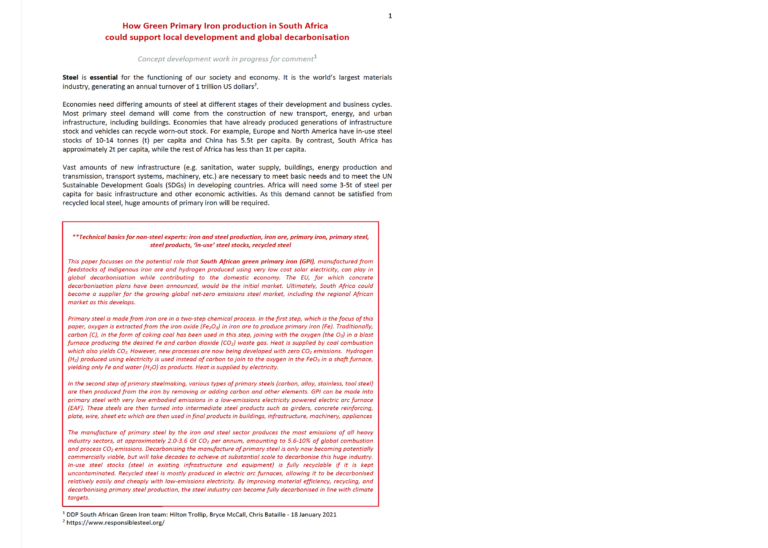
- South Africa
DDP BIICS – South Africa
This 4-page document describes an opportunity for taking first steps to begin decarbonisation of the South African primary steel production industry. It explains the need for industry decarbonisation, recent developments in technologies for zero-emissions primary iron production, the potential competitive advantage for a South African-located plant for export to European markets, the benefits for South Africa and Europe, measures in European markets and international trade that would be necessary to create conditions for a bankable commercial investment and the next steps key real world actors would need to take to begin creating these conditions.
- DDP South African Green Iron team: Hilton Trollip, Bryce McCall, Chris Bataille
- DDP-LAC
- Report
- 2020
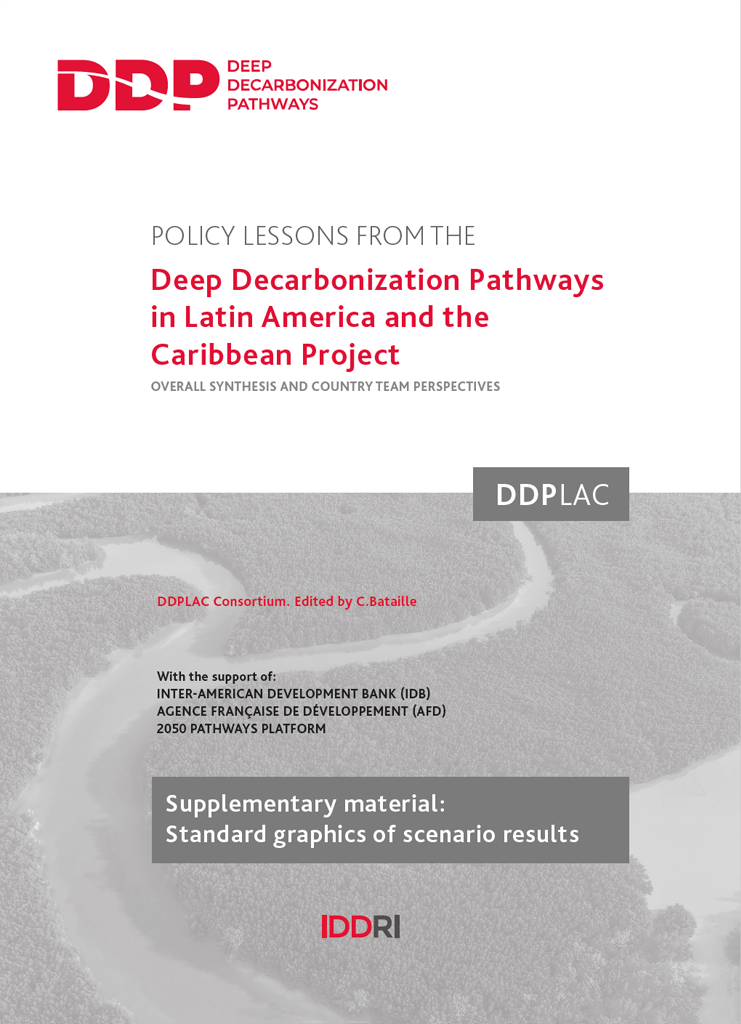
- Argentina, Colombia, Costa Rica, Ecuador, Mexico, Peru
DDP in Latin America and the Caribbean: Supplementary Material – Standard graphics of scenario results
Policy lessons from the Deep Decarbonization Pathways in Latin America and the Caribbean Project. Supplementary Material – Standard graphics of scenario results.
- DDPLAC Consortium. Edited by C.Bataille
- DDP-LAC
- Report
- 2020
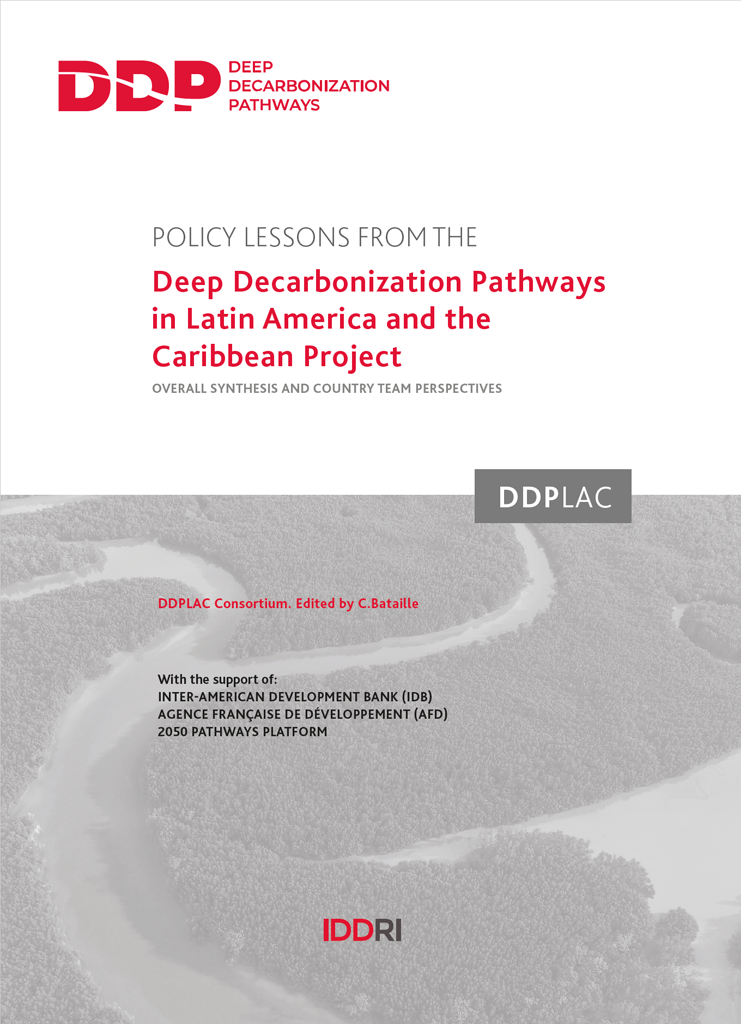
- Argentina, Colombia, Costa Rica, Ecuador, Mexico, Panama, Peru
Policy lessons from the Deep Decarbonization Pathways in Latin America and the Caribbean Project
To meet Paris Agreement goals, Latin America can achieve net-zero emissions by 2050-’70, benefiting air quality and the economy. Countries have the power to define their contributions. Long-term strategies are crucial for climate goals, and 2025-2030 targets should align with net-zero by 2050-’70. Key transformations include electrification, mode shifting, and reducing fossil fuels. Alternative fuels like hydrogen are needed. Comprehensive policies are essential, including subsidy reductions and electrification mandates. International cooperation is vital where capacity gaps exist. Building consensus among stakeholders and reviewing policies for net-zero are immediate priorities.
- DDPLAC Consortium. Edited by C.Bataille
- DDP-Mobility
- Brief
- 2018
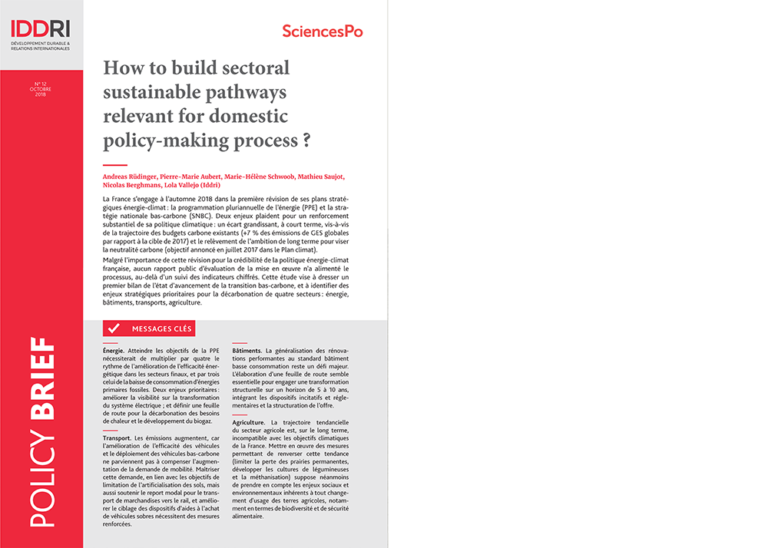
- Cross country
DDP Transport – IDDRI Brief
Different communities of stakeholders have strong opinions about the long-term evolution of the transport sector and argue for specific visions of the low carbon transition consistent with their own situations and priorities.
A key challenge for organizing debates around these alternative visions is that they are very difficult to contrast and compare in the light of common public questions and to assess against their consistency with all national objectives.
This issue analyses how building consistent long-term pathways for the low-carbon future of the passenger transport sector and making them comparable in a transparent manner are key challenges for structuring productive public debates.
- Chris Bataille (IDDRI)Yann Briand (IDDRI) Henri Waisman (IDDRI)
- DDP-Mobility
- Brief
- 2017
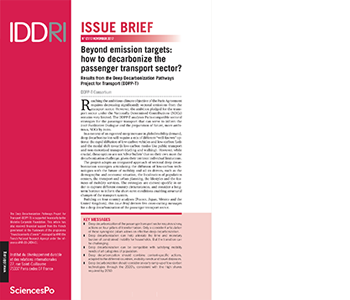
- Cross country
DDP Transport – IDDRI Brief
The Deep Decarbonization Pathways for Transport (DDP-T) project analyzes Paris-compatible sectoral strategies for the passenger transport that can serve to inform the 2018 Facilitative Dialogue and the preparation of future, more ambitious, NDCs by 2020. The project adopts an integrated approach of sectoral deep decarbonization strategies articulating the diffusion of low-carbon technologies with the future of mobility and all its drivers. Building on four country analyses (France, Japan, Mexico and the United Kingdom), this Issue Brief derives five cross-cutting messages for a deep decarbonization of the passenger transport sector.
- DDP-Transport consortium
- DDP-Mobility
- Report
- 2017
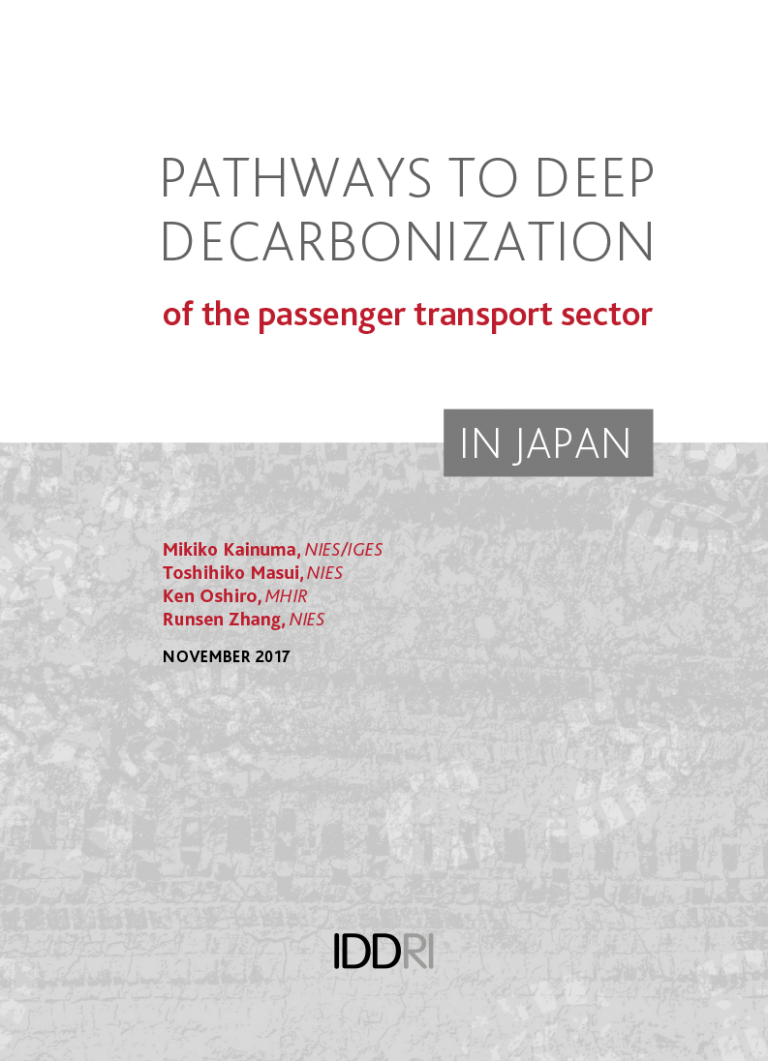
- Japan
DDP Transport – Japan
The passenger transport sector accounted for 12% of Japan’s CO2 emissions in 2010. Two Deep Decarbonization Pathways are structured to investigate the way in which different technical and social transformations can reduce the transport-related energy use and GHG emissions. An advanced technological (AdvancedTech) scenario focuses mainly on the technological innovations and transformations in the transport and energy sector, but does not give consideration to social and behavioural factors. On the other hand, the balanced scenario is structured with the objective of developing a long-term strategy to achieve a drastic GHG emission reduction in transport sector by means of a balanced behavioural and technological changes.
- Mikiko Kainuma (NIES/IGES), Toshihiko Masui (NIES), Ken Oshiro (MHIR), Runsen Zhang (NIES)
- DDP-Mobility
- Report
- 2017

- UK, United Kingdom
DDP Transport – United Kingdom
A key challenge for transport policy in the UK is the Government’s own domestic climate legislation, which mandates “at least” an 80% reduction in greenhouse gas (GHG) emissions relative to 1990 levels by 2050. Past analysis reveals that achieving this target translates into a requirement for the carbon intensity of transport to decline by around 70% on average by 2050. We describe two new scenarios that provide distinctive visions of how passenger transport could evolve in the future, driven by rapid technological progress, changes to societal mobility trends, and the requirement to transition towards low or net-zero energy systems. Both of the scenarios presented achieve similar levels of decarbonisation by 2050, but take very different pathways towards that destination.
- Steve Pye, Francis G.N. Li (UCL)
- DDP-Mobility
- Report
- 2017
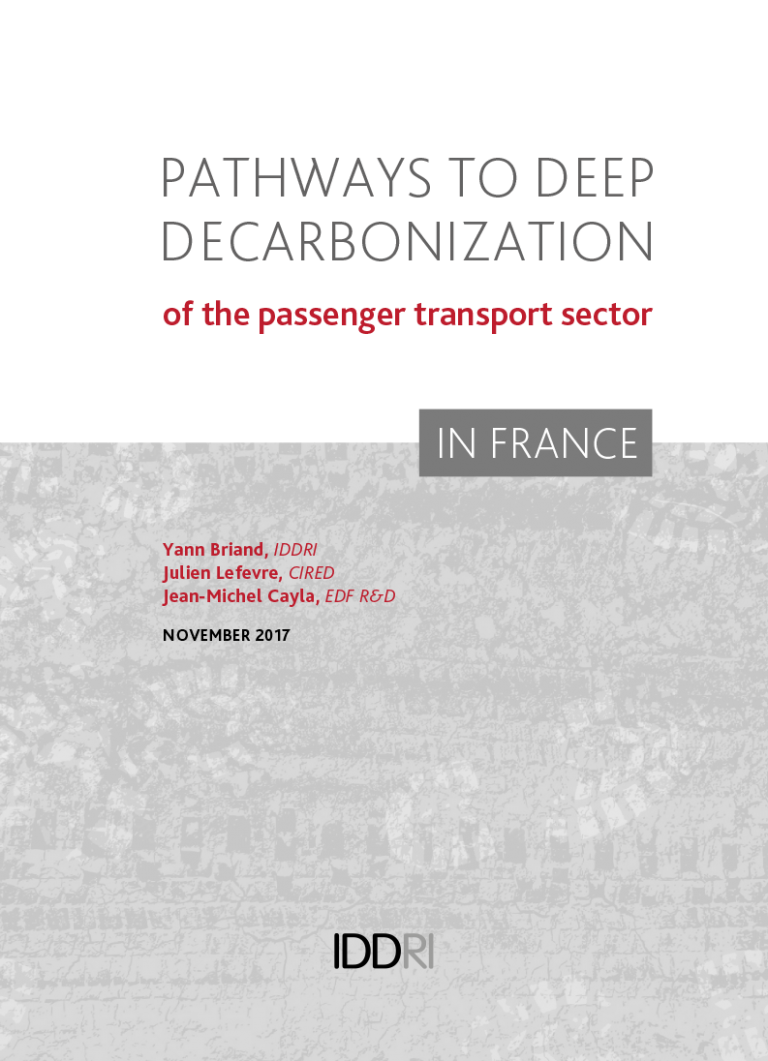
- France, Mexico
DDP Transport – France
The transport sector is the main emitting sector and represented about 26% of total French GHG emissions in 2010. The French DDP team chose to develop two scenarios for the passenger transport sector consistent with the 2°C target and the SNBC objectives, reaching both a reduction of about 78% of CO2 emissions compared to 1990, down to about 20 MtCO2 in 2050. These two deep decarbonization pathways embody contrasting futures of the mobility demand, as well as the supply-side solutions that will be necessary.
- Yann Briand (IDDRI)Julien Lefevre (CIRED)Jean-Michel Cayla (EDF R&D)
- DDP-Mobility
- Report
- 2017
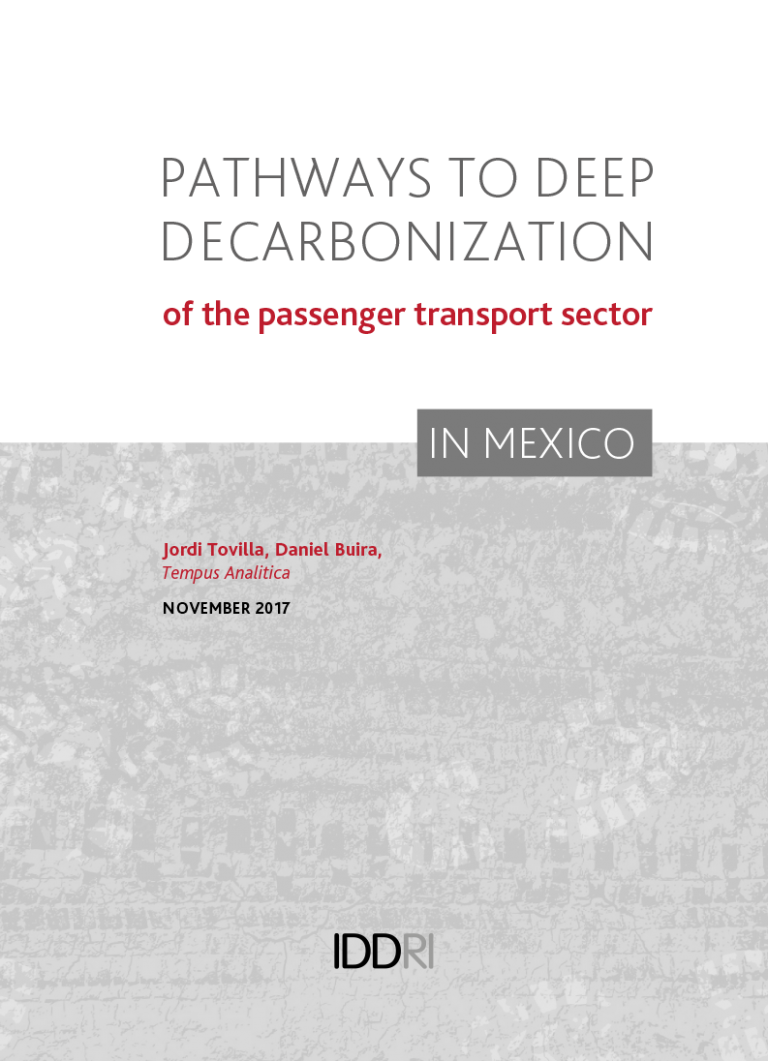
- Mexico
DDP Transport – Mexico
The transport sector is the single largest source of GHG emissions in Mexico with a fourth of the total. Two scenarios are presented, both leading to a 50% reduction in annual CO2 emissions of the passenger transport sector by 2050 (50 MtCO2) compared to the level in 2010.
- Jordi Tovilla (Tempus Analitica) Daniel Buira (Tempus Analitica)